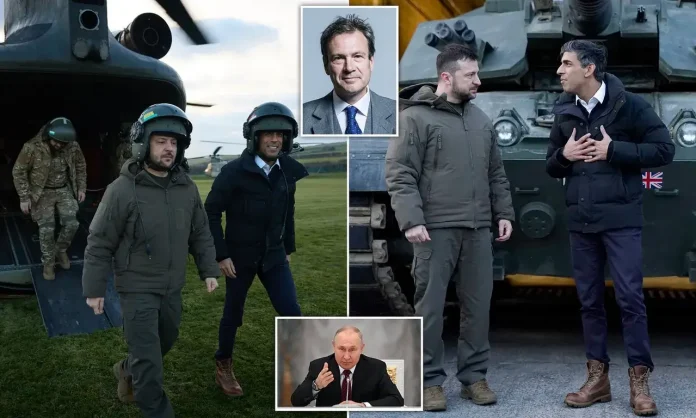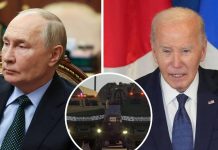Tory MP Bob Seely says risk of escalation is outweighed by threat from Russia
Many years ago, when I was a young reporter, I witnessed something that will stay with me for as long as I live.
My five-year stint as a foreign correspondent based in Ukraine had begun in Easter 1990, when the new freedoms of glasnost permitted the Greek Orthodox Catholics in the west of the country to celebrate Christian festivals openly for the first time since World War II.
It was Good Friday, and Lviv’s baroque churches were ablaze with warm candles, welcoming rural families carrying wicker baskets of traditional painted eggs.

This devotion, smothered by the Communists for almost half a century, had returned so powerfully — as if awakening from hibernation.
But I was not there to report on the joy of the occasion. I was investigating how Greek Catholic priests were then being sent by the Soviet authorities to the destroyed town of Chernobyl — as punishment for their faith.
Ordered to work on the nuclear clean-up operation following the notorious disaster, the priests were not issued with protective clothing.
The deliberate intention was that these men of God would suffer radiation poisoning and develop cancer. Even then, the Kremlin’s cruelty in Ukraine was all too evident.
And now, as President Zelensky’s visit to Britain this week has reminded us, his country is on the front line between freedom and fear.
Putin‘s war is pitting two visions of humanity against each other: openness and democracy versus neo-fascist nostalgia. It is no exaggeration to say that the war this year will help define the 21st century. So how can we ensure that the right side wins?
Yesterday, Zelensky presented the Commons Speaker Sir Lindsay Hoyle with a helmet signed by one of Kyiv’s top pilots. He appealed for the UK to supply ‘powerful’ aircraft.
The message on the helmet read: ‘We have freedom, give us wings to protect it.’ He reiterated calls for fighter jets as well as long-range missiles, adding: ‘We don’t have enough ammunition, because everything obviously is running out and coming out of maintenance.’

The call is loud and clear.
Anyone who thinks a negotiated end can be brought to this conflict as long as Putin and his apparatchiks rule in the Kremlin is deluded.
The dictator genuinely believes Ukraine is part of Russia, no matter what its people think.
He blames the West, led by the U.S., for the collapse of the Soviet Union and he tells the Russian people the corrupt, amoral West wants to shatter Mother Russia into a mosaic of powerless states.
This is what justifies Putin, in his own eyes, in waging war — not only in the bombing of Ukraine but in relentless campaigns of disinformation and political interference aimed at our democracies.In this context, Zelensky’s visit, his meeting with the King and his address to Parliament, is crucial.
He is asking us for more — and we must give him what we wants.
Yes, we should not underestimate the risk of escalation, even up to the use of nuclear weapons.
But from my experience serving in the UK’s past four major military campaigns and having completed a PhD in contemporary Russian warfare, I am confident that the least dangerous course of action is to give the Ukrainians ‘the tools to finish the job’ — as Winston Churchill put it to President Roosevelt in a similar context.
Anything that lengthens this war increases the danger to us all — and will result in even higher casualty rates, especially among our Ukrainian friends.

So as well as jets and artillery, we must also offer armoured personnel carriers and fighting vehicles, and preferably more Challenger 2 tanks — of which we have 100.
The long-range missiles must come with guarantees that they will not be used to target Russian territory. Stocks of ammunition should be all but inexhaustible.
Prime Minister Rishi Sunak has offered to provide more training for Ukrainian soldiers. This is all well and good, but we need more of it.
Putin gave us fair warning as far back as 2007 at the Munich security conference council in which he invoked a new Cold War with the West.
No — beyond training, the emphasis has to be on immediate and practical aid. That means supplying Zelensky’s troops with equipment they can use.
There has been some controversy this week over the RAF’s Typhoon fighters: Britain is unable to send them to Ukraine without the consent of our German partners.
Although Berlin has stepped up its offerings to the Ukrainians recently, in a wider context, it is engaged in magical thinking. It wants Ukraine to win, but it also does not want Russia to lose.
War guilt has become a convenient excuse for hand-wringing (along with German industrial addiction to Russian gas). I am half German and I’m ashamed at Berlin’s sloping shoulders.
Zelensky has also said that two further things are needed: Ukrainian bravery and British leadership.
He is right again.The world needs swift and targeted solutions that promise to end the war as quickly as possible. Ukrainians are running out of useable jet fighters.
Training Ukrainian pilots is a fine thing to do, but — though I understand Zelensky’s clamour for them — I fear the UK’s Typhoons are not the answer.
The maintenance programme would be intense and the short and rough Ukrainian runways are unsuitable.
Better would be to work with our Swedish friends to offer the Saab Gripen, a fighter jet that can be operated by a pilot and one trained crew member, as well as a small ground support team. Saab wants to sell and Ukraine wants to buy.
Best of all, Gripen are versatile enough for Ukraine’s military runways and could even land on highways if needed.
Either way, the longer the war continues, the more difficult it will be to defeat Russia. Putin knows that. He believes he has strategic patience over the West and will fight on as we become divided and distracted.
His strategy is three-fold. First, dig in along a defensible line, World War I-style, and then prepare a series of further defensive lines behind that to prevent sudden breakthroughs.
Second, make life hell for ordinary Ukrainians by destroying electricity and water supplies — bombing their country back to the 19th century.
Third, destroy the umbilical cord of financial and military support binding Ukraine and its Western allies.I saw Russian tactics for myself when I visited southern Ukraine just before Christmas.
In Odessa there was no electricity, in Mykolayiv no water and when we (I travelled with Chris Green MP and former Tory deputy chairman Lord Ashcroft) ventured into Kherson, we were forced to pull back as the shelling intensified, the thud and rumble of impact blasts audible every minute.
But Ukrainians will continue to fight. As they like to say: when the Russian army stops fighting, the war will end — but when Ukraine stops fighting, Ukraine will end.
Ukrainians know their society wasn’t perfect. But in the past two decades they have made a clear and conscious choice.
As Putin’s Russia has gone backwards to authoritarianism and lawlessness, Ukrainians have consciously chosen something better.
They want their state to be just, open and free. They are right to do so. They are right to defend their nation and their state. And we, without being blind to the dangers, are right to help them.












